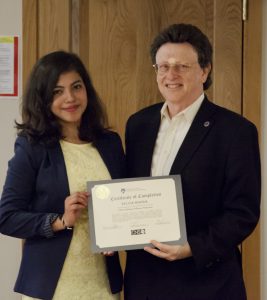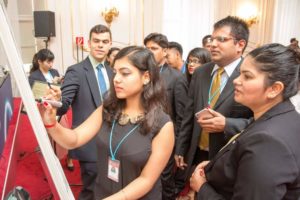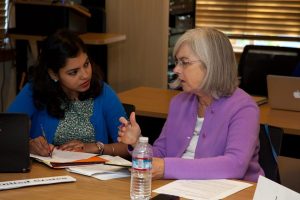A Happy Accident Turned into a Commitment
Working in the nuclear policy field was a happy accident. In June 2016, I was invited to participate in a conference on the Comprehensive Test Ban Treaty’s (CTBT) 20th Anniversary Ministerial Meeting in Vienna. It was my first introduction to the world of nuclear politics and gave me an opportunity to listen to the likes of Lassina Zerbo, Ban Ki-Moon, Rose Gottemoellar, William C Potter and Federica Mogherini present compelling remarks about the importance of CTBT’s entry into force. I was impacted by the enormity of the challenge posed by nuclear weapons as members from the echelons of the global society – scholars, academia, youth, artists and the media – discussed how the CTBT’s entry into force will be a meaningful step towards greater peace and security. I was already working in the field of international security. However, this conference acted as a springboard for me to become interested in the nuclear policy domain and work towards reducing nuclear dangers.
My next steps were in the direction of bolstering my knowledge and understanding of the atomic bomb, its history, arms controls, nonproliferation and disarmament issues at the James Martin Center for Nonproliferation Studies (CNS). At CNS, I worked and learned under the guidance of Dr. William Potter. I had already read several of Dr. Potter’s important works on nuclear terrorism, nonproliferation, and nuclear commerce when I was working as a security analyst in New Delhi. In Monterey, working under his guidance had a strong influence on me and shaped my understanding of nuclear politics, the nuclear nonproliferation treaty (NPT) and the significance of disarmament education.
At CNS, I played the role of the United States delegate to Main Committee 1 to a simulation of the first NPT Preparatory Committee (PrepCom) meeting. During the simulation, I had a wonderful and a motivating experience working briefly with Ambassador Susan Burk. The experience was invaluable for me as I got to learn from Amb Burk about US nuclear modernization and International Partnership for Nuclear Disarmament Verification (IPNDV) and other pressing issues in the nuclear field. Reading and writing on topical nuclear weapons issues ushered me into an entirely new world of examining pathways to nuclear cooperation, nonproliferation, and disarmament. Both Dr. Potter and Amb. Burk took me under their wings, prepared me and provided me with platforms which enabled me to grow personally and professionally and pursue a career in an extremely niche and challenging domain.
My full-hearted commitment to the nuclear policy field emanates from grappling with these very questions: What should be the national security policies of the nine nuclear-armed countries to reduce nuclear dangers? How can we create conditions to secure nuclear arsenals and nuclear materials? There are still many thousands of nuclear weapons in the world—about 95% of them in the U.S. and Russian arsenals. Of the approximately 2,000 nuclear weapons currently deployed by the United States, nearly half are kept on hair-trigger alert. Nuclear missiles kept in the state of readiness increases the risk of an accidental or mistaken launch which can have catastrophic outcomes. And most importantly, the central question, what should we try to achieve in the rest of this century to make the world a safe and secure place for our future generations.
The Scoville Fellowship has been instrumental in paving a path for me to pursue working on some of these hard questions in Washington, DC. Through my interactions with several distinguished experts in the field like former Secretary of Defense Dr. William Perry at the Nuclear Threat Initiative (NTI), I am inspired to continue working to reduce the threats of nuclear use due to accidents, miscalculation, cyber interference or a terrorist group getting a nuclear weapon. At NTI, I worked on the Global Enterprise project, which aims to strengthen the NPT and emerging technologies – unmanned underwater vehicles (UUVs) and the impact of UUVs tech on submarine vulnerability and its ramifications for strategic stability issues.
Today, there is a worldwide recognition that to register progress on matters of global peace and security, women need to be equal partners with men on hard power security conversations. There is a widespread challenge of a gender gap in the area of weapons of mass destruction (WMD). One of the most gratifying aspects working in this domain is also taking actions redress the problem of lack of gender diversity and taking deliberate steps to bridge that gap. It has been both an inspiring and learning experience to lead the CBRN working group at Women of Color Advancing Peace and Security (WCAPS) under the leadership of Dr. Bonnie Jenkins. The CBRN Working Group allows its members to have detailed discussions on nuclear policy and nonproliferation issues and promotes the work of women of color on its portals.
The conference in Vienna in 2016 was a major turning point in my life. As I look back, I am full of gratitude for the opportunity to work in a field that addresses the most pressing challenges of our times – fighting the threat, spread and use of WMD.
Sylvia Mishra was a Spring 2018 Scoville Fellow at the Nuclear Threat Initiative.



